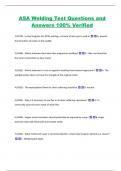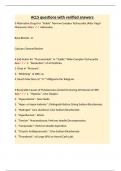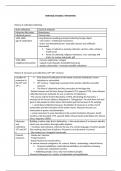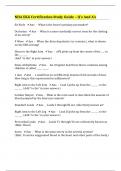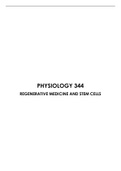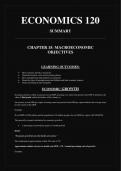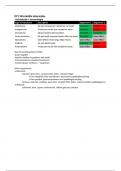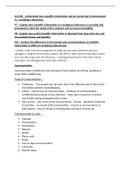Adaption Physiology - Found in Gauteng where • Extensive agriculture:
there is a dense where population
population. densities are low, and
land is inexpensive.
- Found in KZN; less dense
population; cheap land
and high availability.
Feedlot
• Semi-intensive: incorporate elements of both intensive and
extensive management, aiming to combine the benefits while
mitigating the respective disadvantages.
How animals cope with their environment and its variations by
studying:
Introduction to Economics
1. Homeostasis
2. Physiological adaptions • Understanding the impacts of environment on animal
3. Biological adaptions productivity.
4. Genetic adaptions • One may have to modify the environment (provide shelter and
supplementary feed), or it may be more cost effective to select
animals that are more genetically adapted to the existing
How producers affect an animal’s exposure to its environment: environment.
Intensive management Extensive management Is it more cost effective to construct shades and sprinkler systems to
• High input and control vs • Low input and control vs enhance the performance of Bos taurus cattle exposed to the heat, or
output. output. to utilize Bos indicus cattle?
• Higher labour and • Livestock successfully
physical capital relative to acclimate or are - Bos indicus better adapted to the heat (experiences less heat
the land area where genetically adapted to the stress)
production takes place environment. - Bos taurus not as well adapted and so the environment would
- Integrated poultry • Used more land for need to be altered and this costs money (if not altered,
- Confined swine production and reproductive cycles and even behaviour may be affected).
operations profitability.
- Large dairies
, - Shade and sprinklers will improve the well-being and Control System: HPA Axis
productivity, reduce heat stress and improve feed intake.
Hypophyseal-adrenal axis:
- Impact on health and welfare affects long-term productivity and
veterinary costs. • Hypothalamus
• Adrenal glands
- Adrenal medulla
Adaption Overview: - Adrenal cortex
• Adaption: A non-genetic (short term or phenotypic) and genetic
(long-term or generational) response to a challenge (stressor).
- Non-genetic: reduced feed intake/increases respiration rates.
- Short term responses also have a genetic basis because some
animals cope better than others when exposed to same
stressors.
P Phenotype
G Genotype
E Environment
iGE Interaction between G & E
Short-term (Acute) vs Long-term (Chronic) stress
1. Short term
- Stress lasts for a period of minutes/hours
- Involves:
Fight: take action to eliminate stress
Flight: escape stress
Freeze: immobilized by stress
2. Long term
- Persists for several hours per day for weeks/months
there is a dense where population
population. densities are low, and
land is inexpensive.
- Found in KZN; less dense
population; cheap land
and high availability.
Feedlot
• Semi-intensive: incorporate elements of both intensive and
extensive management, aiming to combine the benefits while
mitigating the respective disadvantages.
How animals cope with their environment and its variations by
studying:
Introduction to Economics
1. Homeostasis
2. Physiological adaptions • Understanding the impacts of environment on animal
3. Biological adaptions productivity.
4. Genetic adaptions • One may have to modify the environment (provide shelter and
supplementary feed), or it may be more cost effective to select
animals that are more genetically adapted to the existing
How producers affect an animal’s exposure to its environment: environment.
Intensive management Extensive management Is it more cost effective to construct shades and sprinkler systems to
• High input and control vs • Low input and control vs enhance the performance of Bos taurus cattle exposed to the heat, or
output. output. to utilize Bos indicus cattle?
• Higher labour and • Livestock successfully
physical capital relative to acclimate or are - Bos indicus better adapted to the heat (experiences less heat
the land area where genetically adapted to the stress)
production takes place environment. - Bos taurus not as well adapted and so the environment would
- Integrated poultry • Used more land for need to be altered and this costs money (if not altered,
- Confined swine production and reproductive cycles and even behaviour may be affected).
operations profitability.
- Large dairies
, - Shade and sprinklers will improve the well-being and Control System: HPA Axis
productivity, reduce heat stress and improve feed intake.
Hypophyseal-adrenal axis:
- Impact on health and welfare affects long-term productivity and
veterinary costs. • Hypothalamus
• Adrenal glands
- Adrenal medulla
Adaption Overview: - Adrenal cortex
• Adaption: A non-genetic (short term or phenotypic) and genetic
(long-term or generational) response to a challenge (stressor).
- Non-genetic: reduced feed intake/increases respiration rates.
- Short term responses also have a genetic basis because some
animals cope better than others when exposed to same
stressors.
P Phenotype
G Genotype
E Environment
iGE Interaction between G & E
Short-term (Acute) vs Long-term (Chronic) stress
1. Short term
- Stress lasts for a period of minutes/hours
- Involves:
Fight: take action to eliminate stress
Flight: escape stress
Freeze: immobilized by stress
2. Long term
- Persists for several hours per day for weeks/months

